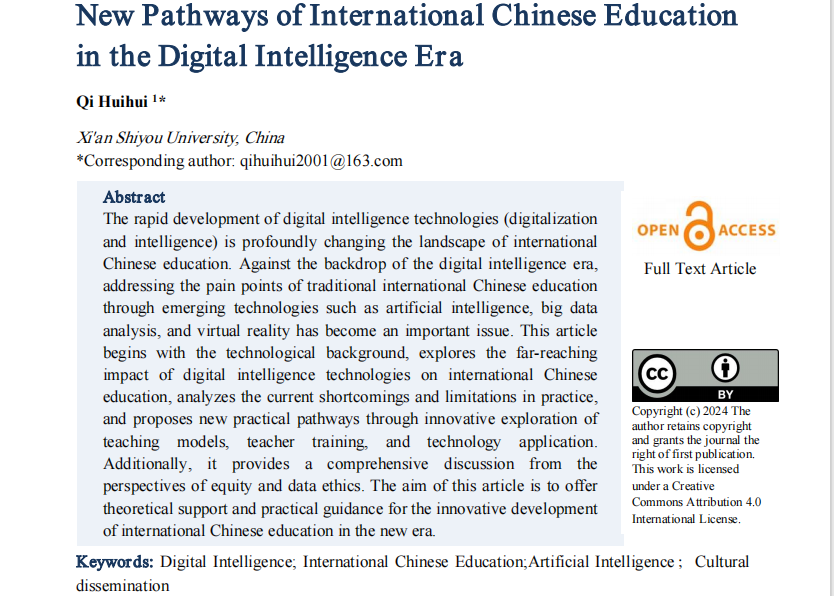New Pathways of International Chinese Education in the Digital Intelligence Era
DOI:
https://doi.org/10.5281/zenodo.14546391Keywords:
Digital Intelligence, International Chinese Education, Artificial Intelligence, Cultural disseminationAbstract
The rapid development of digital intelligence technologies (digitalization and intelligence) is profoundly changing the landscape of international Chinese education. Against the backdrop of the digital intelligence era, addressing the pain points of traditional international Chinese education through emerging technologies such as artificial intelligence, big data analysis, and virtual reality has become an important issue. This article begins with the technological background, explores the far-reaching impact of digital intelligence technologies on international Chinese education, analyzes the current shortcomings and limitations in practice, and proposes new practical pathways through innovative exploration of teaching models, teacher training, and technology application. Additionally, it provides a comprehensive discussion from the perspectives of equity and data ethics. The aim of this article is to offer theoretical support and practical guidance for the innovative development of international Chinese education in the new era.
References
[1]Knox, J. (2020). Artificial intelligence and education in China. Learning, Media and Technology, 45(3), 298-311.
[2]Li, J., Ju, S. Y., Zhu, C., Yuan, Y., Fu, M., Kong, L. K., & Li, M. (2024). The development of a digital intelligence quotient scale: A new measuring instrument for primary school students in China. Heliyon, 10(16).
[3]Wang, B., Liu, H., An, P., Li, Q., Li, K., Chen, L., ... & Gu, S. (2018). Artificial intelligence and education (pp. 129-161). Springer Singapore.
[4]Pedro, F., Subosa, M., Rivas, A., & Valverde, P. (2019). Artificial intelligence in education: Challenges and opportunities for sustainable development.
[5]Bantugan, B. S., Li, X., Liu, L., Liu, Y., Wang, X., Yang, M., & Zhang, X. (2024). The Adoption of Artificial Intelligence of Selected International Chinese Educators Enrolled as Graduate Students in the College of Education of St. Paul University Manila. International Journal of Research and Scientific Innovation, 11(2), 133-146.
[6]Zhao, X., Xu, J., & Cox, A. (2024). Incorporating artificial intelligence into student academic writing in higher education: the use of wordtune by Chinese international students.

Downloads
Published
How to Cite
Issue
Section
License
Copyright (c) 2024 QIHUIHUI 祁慧慧

This work is licensed under a Creative Commons Attribution 4.0 International License.


























